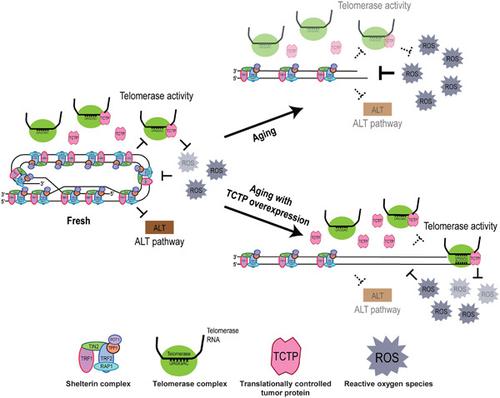当前位置:
X-MOL 学术
›
J. Cell. Physiol.
›
论文详情
Our official English website, www.x-mol.net, welcomes your
feedback! (Note: you will need to create a separate account there.)
TCTP overexpression reverses age-associated telomere attrition by upregulating telomerase activity in mouse oocytes
Journal of Cellular Physiology ( IF 4.5 ) Pub Date : 2021-08-18 , DOI: 10.1002/jcp.30557 Hyuk-Joon Jeon 1 , Minsung Kang 2 , Jae-Sung Kim 2 , Jeong Su Oh 1, 3
Journal of Cellular Physiology ( IF 4.5 ) Pub Date : 2021-08-18 , DOI: 10.1002/jcp.30557 Hyuk-Joon Jeon 1 , Minsung Kang 2 , Jae-Sung Kim 2 , Jeong Su Oh 1, 3
Affiliation

|
A prolonged time span between ovulation and fertilization can cause postovulatory aging of oocytes, which impairs oocyte quality and subsequent embryo development. Telomere attrition has long been considered as the primary hallmark of aging or the cause of age-associated diseases. However, the status of telomere and its regulation during postovulatory oocyte aging are poorly understood. Here we found that oocytes experience telomere shortening during postovulatory aging, although they have the capacity to maintain telomere length. However, translationally controlled tumor protein (TCTP) overexpression could reverse age-associated telomere shortening by upregulating telomerase activity in mouse oocytes. Telomere length in mature oocytes gradually decreased with postovulatory aging, which was associated with a marked reduction in TRF1 expression, decreased telomerase activity, and decreased homologous combination (HR)-based alternative lengthening of telomeres (ALT) with a concomitant increase in oxidative stress. Surprisingly, however, overexpression of TCTP led to a remarkable increase in telomere length during postovulatory aging. Notably, neither TRF1 nor BRCA1 level was altered by TCTP overexpression. Moreover, TCTP-mediated telomere lengthening was not blocked by HR inhibition. In striking contrast, telomerase activity, as well as TERT and TERC levels, increased after TCTP overexpression. Importantly, unlike the chromosome-wide distribution of endogenous TCTP, overexpressed TCTP was ectopically localized at telomeres, implying that TCTP overexpression is required to increase telomerase activity. Collectively, our results demonstrate that TCTP prevents telomere attrition during postovulatory aging by upregulating telomerase activity in mouse oocytes.
中文翻译:

TCTP 过表达通过上调小鼠卵母细胞中的端粒酶活性来逆转与年龄相关的端粒磨损
排卵和受精之间的时间跨度延长会导致卵母细胞在排卵后老化,从而损害卵母细胞质量和随后的胚胎发育。长期以来,端粒磨损一直被认为是衰老的主要标志或与年龄相关的疾病的原因。然而,对排卵后卵母细胞衰老过程中端粒的状态及其调节知之甚少。在这里,我们发现卵母细胞在排卵后老化期间经历端粒缩短,尽管它们具有维持端粒长度的能力。然而,翻译控制的肿瘤蛋白 (TCTP) 过表达可以通过上调小鼠卵母细胞中的端粒酶活性来逆转与年龄相关的端粒缩短。成熟卵母细胞的端粒长度随着排卵后衰老而逐渐减少,这与 TRF1 表达的显着降低有关,端粒酶活性降低,基于同源组合(HR)的端粒选择性延长(ALT)降低,同时氧化应激增加。然而,令人惊讶的是,TCTP 的过表达导致排卵后衰老期间端粒长度显着增加。值得注意的是,TCTP 过表达不会改变 TRF1 和 BRCA1 水平。此外,TCTP 介导的端粒延长并未被 HR 抑制所阻断。形成鲜明对比的是,端粒酶活性以及 TERT 和 TERC 水平在 TCTP 过表达后增加。重要的是,与内源性 TCTP 的全染色体分布不同,过表达的 TCTP 异位定位于端粒,这意味着 TCTP 过表达是增加端粒酶活性所必需的。集体,
更新日期:2021-08-18
中文翻译:

TCTP 过表达通过上调小鼠卵母细胞中的端粒酶活性来逆转与年龄相关的端粒磨损
排卵和受精之间的时间跨度延长会导致卵母细胞在排卵后老化,从而损害卵母细胞质量和随后的胚胎发育。长期以来,端粒磨损一直被认为是衰老的主要标志或与年龄相关的疾病的原因。然而,对排卵后卵母细胞衰老过程中端粒的状态及其调节知之甚少。在这里,我们发现卵母细胞在排卵后老化期间经历端粒缩短,尽管它们具有维持端粒长度的能力。然而,翻译控制的肿瘤蛋白 (TCTP) 过表达可以通过上调小鼠卵母细胞中的端粒酶活性来逆转与年龄相关的端粒缩短。成熟卵母细胞的端粒长度随着排卵后衰老而逐渐减少,这与 TRF1 表达的显着降低有关,端粒酶活性降低,基于同源组合(HR)的端粒选择性延长(ALT)降低,同时氧化应激增加。然而,令人惊讶的是,TCTP 的过表达导致排卵后衰老期间端粒长度显着增加。值得注意的是,TCTP 过表达不会改变 TRF1 和 BRCA1 水平。此外,TCTP 介导的端粒延长并未被 HR 抑制所阻断。形成鲜明对比的是,端粒酶活性以及 TERT 和 TERC 水平在 TCTP 过表达后增加。重要的是,与内源性 TCTP 的全染色体分布不同,过表达的 TCTP 异位定位于端粒,这意味着 TCTP 过表达是增加端粒酶活性所必需的。集体,











































 京公网安备 11010802027423号
京公网安备 11010802027423号